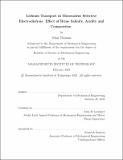Lithium Transport in Monovalent Selective Electrodialysis: Effect of Brine Salinity, Acidity and Composition
Author(s)
Thomas, John
DownloadThesis PDF (4.180Mb)
Advisor
Lienhard, John H.
Terms of use
Metadata
Show full item recordAbstract
Lithium is an increasingly important resource for electrification but current supply will not keep up with expected demand. Monovalent selective electrodialysis (MSED) offers a potential method to separate lithium from other elements from salt lake brine. A monovalent selective electrodialysis setup was used to test conditions of pH, salinity, coexisting cations, and current density in the effectiveness in lithium extraction from salt lake brines. MSED of multi-component brines containing more coexisting ions is shown to be less effective than brines with only one coexisting cation. The study shows that pH 7 had significantly higher separation coefficient than lower pH without significant negative impact on current efficiency. The lowest salinity brines of 10 g/L showed the highest separation coefficient, approaching 10 for the Chinese brine, while still having similar current efficiency to the higher salinity brines. Current density is also shown to increase the separation coefficient 3x while only only reducing current efficiency by 50% or less.
Date issued
2023-02Department
Massachusetts Institute of Technology. Department of Mechanical EngineeringPublisher
Massachusetts Institute of Technology